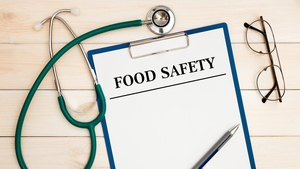The U.S. Department of Agriculture is the target of a complaint over 2019 rules governing the disclosure of "bioengineered food" in a lawsuit brought by the Center for Food Safety, Natural Grocers and several other plaintiffs.
.png?width=850&auto=webp&quality=95&format=jpg&disable=upscale)
U.S. regulations governing the labeling of “bioengineered food” were challenged Monday in a lawsuit filed in California against the U.S. Department of Agriculture.
USDA’s rules that took effect in 2019 “will leave the majority of GMO-derived foods unlabeled; discriminate against tens of millions of Americans; prohibit the use of the widely known terms ‘GMO’ and ‘GE’; and prohibit retailers from providing more information to consumers,” according to the nonprofit Center for Food Safety (CFS), one of the plaintiffs, in a news release.
The lawsuit, pending in the U.S. District Court for the Northern District of California, moved to have the court declare the regulations unlawful and nullify them, then order USDA to address portions of the rules alleged to be unlawful. CFS was joined in the lawsuit by Natural Grocers, Citizens for GMO Labeling, Label GMOs, Rural Vermont, Good Earth Natural Foods and Puget Consumers Co-op.
Plaintiffs challenged USDA permitting electronic disclosures on packaging—otherwise known as a “QR code” or “smartphone” labeling—without requiring additional information on the label.
USDA moved ahead with QR codes despite a study that showed they would fail, according to CFS. While 62% of study respondents did not express challenges that might affect their access to information in a digital link, researchers in the third-party study conducted by Deloitte “observed key technological challenges that prevented nearly all participants from obtaining the information through electronic or digital disclosure methods.” However, the study concluded the technological challenges could be overcome through proper implementation of the law.
The lawsuit is concerned with nomenclature— specifically USDA limiting the use of the term “bioengineered” when making required disclosures on food packages. According to plaintiffs, USDA prohibited the use of “GE” and “GMO” in on-package text or symbol labeling, despite those terms being widely used and understood by the public.
“For 25 years, all aspects of the public dialog around GE foods—scientific, policy, market, legislative, consumer—have used either ‘genetically engineered’ (GE) or ‘genetically modified’ (GMO) to refer to genetically engineered foods,” the lawsuit stated. “Those are terms that all federal agencies, including USDA during this very rulemaking, used. They are what the public knows, understands, and expects, and what is currently used in the marketplace by producers.”
While USDA’s Agricultural Marketing Service (AMS) acknowledged concerns raised by commentators to its draft rule that the term “bioengineering” could confuse the public, the agency disagreed.
“AMS considered similar terms to bioengineering as permitted by the amended Act, but ultimately determined that bioengineering and bioengineered food accurately reflected the scope of disclosure and the products and potential technology at issue,” the agency stated in the final rule.
The lawsuit also challenged USDA’s restriction on which foods are covered by the rule and mandate disclosure.
“The vast majority of GE foods (by some estimates over 70%) are not whole foods, but highly processed foods with GE ingredients, like sodas and oils,” CFS explained in the news release. “Yet in the final rule USDA excluded these ‘highly refined’ products, unless the GE material was ‘detectable.’”
According to CFS, USDA also improperly restricted retailers and products from voluntarily providing additional information to consumers that would be more meaningful to them, such as using the terms GMO and GE.
A USDA spokesperson declined to comment, citing "pending litigation.”
Congress in 2016 passed the Bioengineered Food Disclosure Act, which directed USDA to issue regulations regarding foods required to make a disclosure indicating food is or may be bioengineered.
On Dec. 20, 2018, Agriculture Secretary Sunny Perdue—one of the named defendants in the lawsuit—announced the “National Bioengineered Food Disclosure Standard.” Jan. 1, 2022 is the mandatory date for compliance with the regulations, which took effect last year.
About the Author(s)
You May Also Like






